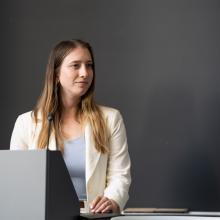Hometown: Boston, MA
Favorite movies: The Seventh Seal, Lost Highway
When did you know you wanted to pursue a Ph.D. in Cinema and Media Studies?
I didn’t know I wanted to pursue a Ph.D. in CMS until I finished my master’s degrees in Literature, which I did in France. There, I got the chance to study the cinema of David Lynch and the paradoxes of self-reference and logical philosophy, which unlocked a newfound interest in cinema for me. Through that discovery and various projects, I realized I was heading in a direction that shifted away from literature and more into cinema and media. So, it kind of went through this weird progression of moving from comparative literature to cinema studies, to realizing I want to work with digital media.
Why did you decide to focus on digital media? Do you have any ongoing or upcoming projects?
I have always been a habitual YouTube user, which really came into play when I was studying abroad in France in college, because I became very homesick and turned to YouTube as a remedy. I would spend a lot of time listening to commentary videos and the Jenna & Julien podcast made by Jenna Marbles and her partner. I became really inspired by some of the discussions they were having about YouTube, which then influenced me to center my research around the platform. To go into more detail, my research focuses on the culture and economy of the platform. My current project focuses on YouTube monetization and how it impacts the true crime community.
You have two master’s degrees, one from Columbia University and one from Ecole des Hautes Etudes en Sciences Sociales in France. What was that process like?
Basically, I applied to a bunch of Ph.D. programs right out of undergrad with no master’s degree and I did not get into any of them. On a whim, I applied for a master’s program in History and Literature at Columbia University that takes place all in France and I got accepted. So, half of my coursework would be in English with visiting professors from Columbia and the other half would be in French at multiple French universities. By the end of the program, I decided to stay in France and chose EHESS as the institution where I would complete my master’s degree and continue my research.
How was your experience studying at the EHESS in France?
It was quite a unique experience. I studied there during COVID so many of the classes went online halfway through. There was also a lot of social and political unrest, so there were transportation strikes. The school was politically engaged as well, so they would cancel classes to be in solidarity with the strikes. Nevertheless, I think the experience gave me a lot of empathy for non-native English speakers and students. I’m not a native French speaker so I understand how it feels to be in a foreign classroom, where you’re very interested in the topic, and you want to contribute, but you’re too afraid to say something. I would like to carry forward that perspective in my teaching and be more considerate toward students’ linguistic and cultural contexts.
I heard that you are teaching a class right now and another one in the Spring! Can you tell us some details about those?
I am currently teaching CMS 297, a special topics course called YouTube In Focus. Each week we explore a different methodology for analyzing social media platforms. For example, we study network theory, the history of the internet and platforms like YouTube, internet aesthetics, media economy, etc. My main goal for the class is to give students multiple lenses they can use to examine and think more critically about the platforms they use every day. I will also be teaching CMS 301: Film Analysis with Yumo Yan in the Spring, so look out for that.
Advice for students that want to major in CMS or pursue a higher degree in CMS?
Talk to your instructors and go to their office hours. Ask them about the possibilities of studying CMS and what it encompasses. CMS isn’t just film studies; you can get very creative and interdisciplinary with it. So, talk to professors that do a diverse range of research, and don’t limit your interests just because you think it only fits in a certain category. As for students wanting to pursue a higher degree in CMS: think about the purpose of getting an M.A. or a Ph.D. For Ph.D. hopefuls, I personally believe you need to enjoy doing research and have a love for teaching. It should not be a decision because you don’t know what else to do, it needs to be motivated by your passion for the subject and a clear goal.
